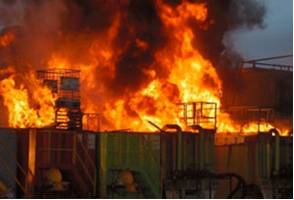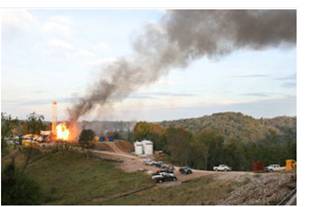
Incident Report Subject: Explosion at West Virginia Gas Fracking Site Injures at Least Five Date of Email report: Sat 13/07/2013 Report Detail:
A spark led to a flash explosion and blaze when a problem occurred during the “flow back” process, in which drilling fluids are pumped into storage tanks, said Pat Heaster, director of emergency services in Doddridge County. The gas well was operated by Antero Resources, according to Reuters. Fracking drilling for natural gas involves injecting tons of silica sand, a massive mix of more than 600 chemicals, and water underground via a drill into a concrete well that extends to an underground bed of shale rock. When this combination reaches the rock, it is blasted apart and natural gas is released and supposed to be returned to the surface and captured. Flow back is part of the hydraulic fracturing—fracking—process. In this case, two tanks containing brine and well fracking fluid exploded at 4:00 a.m. on Sunday, according to Antero vice president and spokesman Alvyn Schopp. Five workers suffered burns and were taken to the hospital he said adding “We do not know the ignition source, but we suspect it was a methane explosion.” Antero is an oil and natural gas company controlled by Warburg Pincus LLC, according to Reuters. West Virginia Department of Environmental Protection (DEP) and federal Occupational Safety and Health Administration (OSHA) officials were at the scene and conducting an investigation, according to Reuters. DEP spokeswoman, Kathy Cosco, said that a pump malfunction appeared to be involved; however, no conclusions have been made. A well site containment system has kept the fluids from flooding the area. Meanwhile, we recently wrote that a study revealed that benzene and other pollutants were found in the air at seven natural gas drilling sites in three West Virginia counties. Fracking has long been associated with fears of water supply contamination and critics have long argued that this drilling devastates the environment and contaminates groundwater, underground water aquifers, and nearby and widespread fresh water supplies. Either through the fault of shoddy wells, poorly trained well workers, or through a questionable drilling process altogether, natural gas and the contents of the drilling fluid may be released underground through cracks in the wells or the fractures created by the drilling. This, many area residents closest to wells believe, has led to a contamination of water supplies, in some cases rendering water completely contaminated. With natural gas production up 30 percent since 2005, these concerns are gaining traction. In fact, a U.S. Environmental Protection Agency (EPA) review of well safety is in progress and scheduled for release in 2014. As gas drilling has expanded and thousands of wells have been opened in just the last few years, residents from New York, Pennsylvania, Ohio, Maryland, West Virginia, and New Jersey have raised concerns over the safety of drilling. While some believe drilling is an answer to a down-turned economy and energy dependence, more believe drilling is putting the fresh water supplies for millions of people at risk, with the risk greatest for those living closest to the drilling boom.
Additional Documentation:
|


